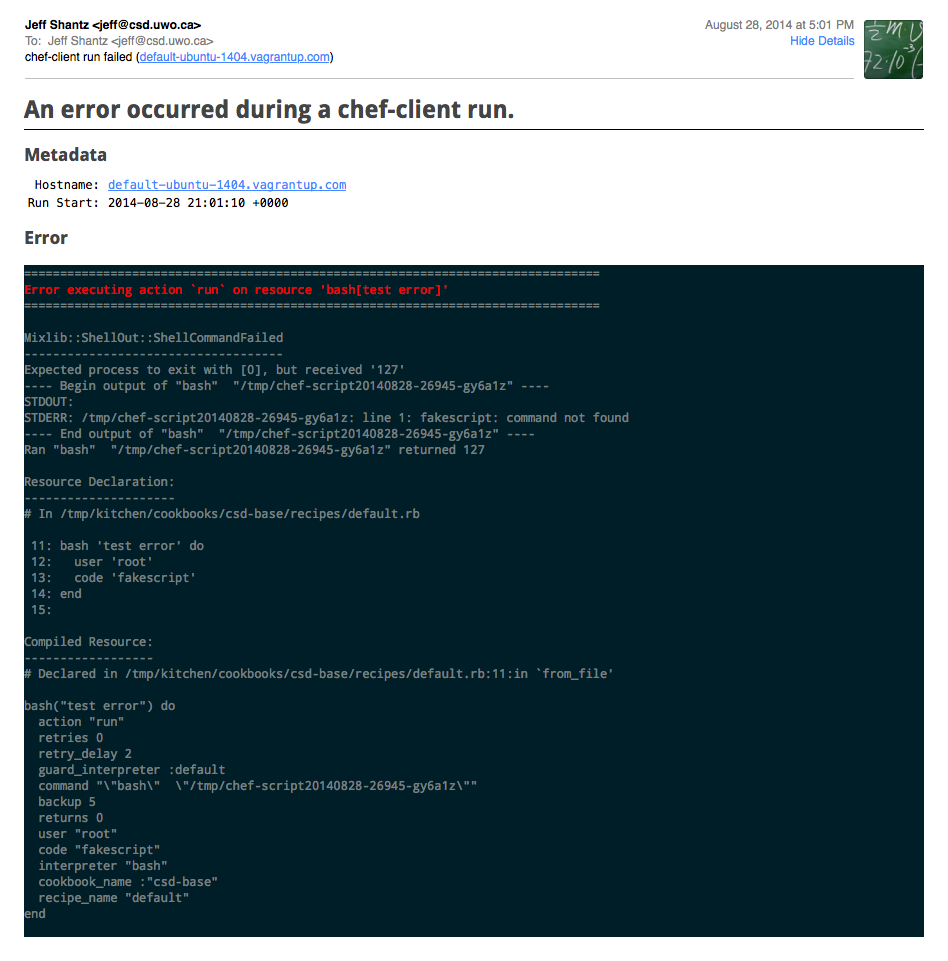Chef-email-reporter
Sends chef-client errors via email. More detailed than a simple chef_handler.
chef-email-reporter
This gem extends the Chef client, allowing notifications to be sent via email
to a pre-determined address when a chef-client run fails on a node. This
gives administrators the confidence that errors on Chef nodes won't go
unnoticed.
While it is possible to do this with a simple handler (see
http://docs.getchef.com/handlers.html), one typically only receives the text of
the exception with a handler. chef-email-reporter provides information
identical to what one would receive when running chef-client at the terminal:
the exception, the resource declaration, and the compiled resource. See below
for a sample email sent by chef-email-reporter.

Having this additional information can ease troubleshooting for administrators.
Installation
Install the chef-email-reporter gem on the node:
/opt/chef/embedded/bin/gem install chef-email-reporter
Add something like the following to your /etc/chef/client.rb file (see the
Usage section below for more details):
gem "chef-email-reporter"
require "chef-email-reporter"
Mail.defaults do
delivery_method :smtp, address: 'smtp.example.com'
end
email_sender "no.reply@example.com"
email_recipient "chef-notifications@example.com"
Profit.
Usage
Assuming you have already installed chef-email-reporter on your node, you must
activate it by adding the following to your /etc/chef/client.rb file:
gem "chef-email-reporter"
require "chef-email-reporter"
You should also specify the sender and recipient email addresses for
notifications sent by chef-email-reporter:
email_sender "no.reply@example.com"
email_recipient "chef-notifications@example.com"
Finally, depending on how you want your mail delivered, you may need to specify
some settings for Mail.defaults. See the examples below for an idea of what
is possible.
Examples
chef-email-reporter uses the mail gem to deliver email, so any delivery
methods supported by mail are supported. For full details, see the
documentation at https://github.com/mikel/mail. Since the documentation is
lacking slightly, you are advised to have a look in the comments in the files at
https://github.com/mikel/mail/tree/master/lib/mail/network/delivery_methods.
Sending email via SMTP
Add the following to /etc/chef/client.rb:
gem "chef-email-reporter"
require "chef-email-reporter"
Mail.defaults do
delivery_method :smtp, {
:address => "smtp.example.com",
:port => 25,
:domain => "example.com",
:user_name => "jeff",
:password => "secret",
:authentication => "plain",
:enable_starttls_auto => true
}
end
email_sender "no.reply@example.com"
email_recipient "chef-notifications@example.com"
Examples for sending email via Gmail and Amazon SES are provided in the wiki
for the mail gem:
- Gmail: https://github.com/mikel/mail/wiki/Sending-email-via-Gmail-SMTP
- Amazon SES: https://github.com/mikel/mail/wiki/Sending-email-via-Amazon-SES
Sending email via sendmail
gem "chef-email-reporter"
require "chef-email-reporter"
Mail.defaults do
delivery_method :sendmail
end
email_sender "no.reply@example.com"
email_recipient "chef-notifications@example.com"
If your sendmail binary is not located at /usr/sbin/sendmail, you can
specify its location as an argument:
Mail.defaults do
delivery_method :sendmail, :location => '/absolute/path/to/your/sendmail'
end
Sending email via exim
gem "chef-email-reporter"
require "chef-email-reporter"
Mail.defaults do
delivery_method :exim
end
email_sender "no.reply@example.com"
email_recipient "chef-notifications@example.com"
If your exim binary is not located at /usr/sbin/exim, you can specify its
location as an argument:
Mail.defaults do
delivery_method :exim, :location => '/absolute/path/to/your/exim'
end
Integrating the gem into your workflow
One might wonder how to integrate into one's workflow. While the method of integration will vary from deployment to deployment, I will briefly discuss how I've integrated it into mine.
In my organization, I've configured bare-metal deployment via Razor Server (https://github.com/puppetlabs/razor-server). After Razor deploys the operating system, it runs a script on the node which:
- Installs Chef
- Installs the
chef-email-reportergem - Writes a basic
/etc/chef/client.rb - Runs
chef-clientto register and configure the node
Of course, you don't need to be running Razor Server to use this gem. Simply
have whichever bare-metal deployment solution you're running install the gem and
configure /etc/chef/client.rb. If you're not running a bare-metal deployment
solution, then you'll simply have to perform these steps manually.
Contributing
- Fork it (https://github.com/jeffshantz/chef-email-reporter/fork)
- Create your feature branch (
git checkout -b my-new-feature) - Commit your changes (
git commit -am 'Add some feature') - Push to the branch (
git push origin my-new-feature) - Create a new Pull Request
License
Copyright 2014, Jeff Shantz
Licensed under the Apache License, Version 2.0 (the "License");
you may not use this file except in compliance with the License.
You may obtain a copy of the License at
http://www.apache.org/licenses/LICENSE-2.0
Unless required by applicable law or agreed to in writing, software
distributed under the License is distributed on an "AS IS" BASIS,
WITHOUT WARRANTIES OR CONDITIONS OF ANY KIND, either express or implied.
See the License for the specific language governing permissions and
limitations under the License.